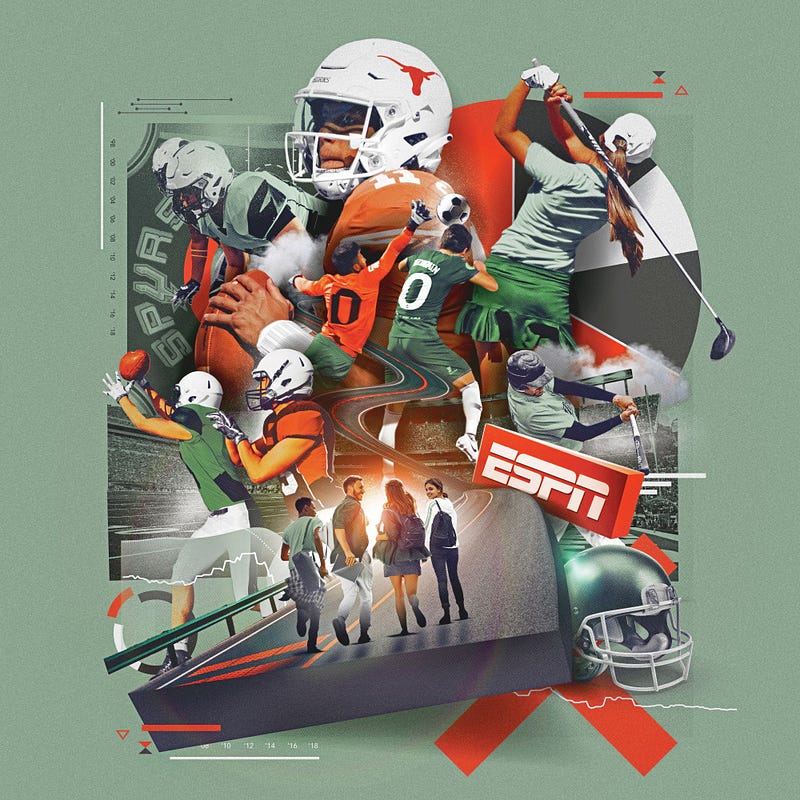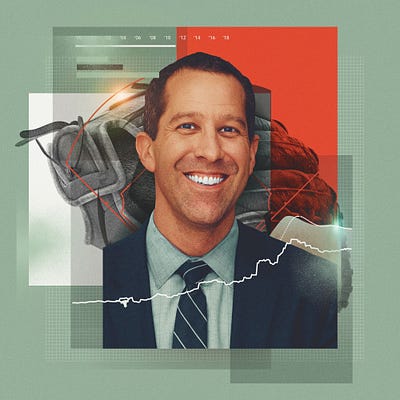Game Changer
McCombs launches Business of Sports minor to prepare new industry leaders
By Alberta Phillips | Illustrations by The Sporting Press

Alamin Momin, an engineering major at The University of Texas at Austin, enjoys planning and developing products to solve problems, but that’s not his only ambition. He has long aspired to a job in the professional sports world, if only he knew how to get in.
Although the path from electrical engineering to product management is straightforward, the road leading to a career in the business of sports is often vague, circuitous, or mysterious. Even so, Momin has held on to his desire to someday work for an NBA team or a professional sports organization.
Luck — and a bit of online sleuthing — kicked in to open a door to Momin’s aspiration.
“Sports is something that we all want to work in, but it’s notorious for being an industry where you have to know people and make connections,” says Momin, 21, who plans to graduate in December 2022. “Compared to investment banking or software engineering, you have to work through a lot of bureaucracy and back-end stuff.”
During his sophomore year, Momin went online to find people who were working in professional sports. A cold email connected him to Kirk Goldsberry, a member of McCombs’ management faculty and associate director of the business school’s Center for Leadership and Ethics. Goldsberry, who works for ESPN as an NBA analyst and formerly as vice president of strategic research for the San Antonio Spurs, is a pioneer in the world of basketball analytics. He made space for Momin on sports analytics projects he had in the works with other students. Now, a new sports institute at McCombs is giving students aspiring to careers in the sports entertainment industry a new opportunity to learn about and break into the field. Goldsberry has been tapped to lead McCombs’ new Business of Sports Institute.
Starting in fall 2022, UT students who want to pursue careers in sports won’t have to journey a roundabout route, guess about how to break into the industry, or depend so heavily on luck. Instead, students will be able to follow a clearly paved road, obtaining a minor in analytics and the business of sports through the new institute. The institute stands out among its peers nationwide because it is the first among sports-powerhouse universities to bring together under one roof key components of the sports entertainment industry: research analytics, a curriculum for undergraduate students, and signature events showcasing leaders and influencers in the sports entertainment world.
“It aims to prepare a new generation of students for careers in the elite ranks of the sports industry, from analysts and agents to those who market or produce sports products and occupy front office or other management jobs,” explains Ethan Burris, McCombs’ senior associate dean for academic affairs. The academic minor will be open to UT students from across disciplines.
The growth in the global sports market is accelerating a trend in higher education: In recent years, colleges have been creating courses and degrees to help prepare students for careers in the sports and recreation fields. The rise of big data and predictive analytics has added technological tools, which McCombs is emphasizing via a partnership with global professional services firm Accenture in its sports institute.
The McCombs institute has two key features that set it apart from other universities engaged in a similar enterprise: a research arm that yields new products that help sports organizations improve their teams, brands, and customer experience; and events that bring boldface names in sports to campus, such as a first-ever Texas Business of Sports Summit hosted by McCombs in September.



Natural fit
McCombs is uniquely situated for an institute that blends the business side of sports, ground-breaking research in performance analytics, and a sports-focused curriculum, Burris says. As a founder of the institute, he notes that it has three huge built-in assets: a world-class business school, a nationally ranked and profitable NCAA sports program, and the resources of a top-tier research institution.
“If you look around the country, there are certainly institutions that focus on sports analytics, but they don’t have the curricular degree programs attached to them and help students navigate those pathways and place them,” Burris says. “There are other places that have curricular degree programs, but they don’t have the sports pedigree that UT does.”
The Business of Sports Institute, which is being rolled out in phases during the next year, launched in fall 2021 after Accenture provided a founding gift of $1.4 million. The money is financing the research venture, the first arm of the institute to be up and running.
Inspired by Moneyball
Though the institute’s origins started with conversations Burris had with Goldsberry about three years ago, Burris says its roots stretch back to 2003, when the book Moneyball: The Art of Winning an Unfair Game was published. Written by Michael Lewis, the book chronicles how then-Oakland A’s General Manager Billy Beane used sabermetrics, or statistical analyses, to assemble a competitive team, despite Oakland’s having the smallest budget in the league. The nonfiction book was the basis of the critically acclaimed 2011 film Moneyball starring Brad Pitt. Goldsberry says that while analytics have become a big part of the sports world, much more could be done to push the field forward, given evolving technological tools and trends.
“If Moneyball taught us anything, it’s that lessons from the business world, particularly finance and financial reasoning, are important for the sports world to understand and adopt,” says Goldsberry, author of The New York Times sports and fitness bestseller Sprawlball. Since 2019, Goldsberry has been teaching a sports analytics class at McCombs. The class uses data to assess and predict an athlete’s or team’s performance or prospects and uses storytelling to communicate what the numbers show.
The aspiration for the institute’s research is to build a program that solves emerging problems or challenges in professional sports — and in some cases, college sports — just as Beane did in major league baseball, but on a much larger and broader scale. For example, sports analytics could be used to figure out which players or coaches to recruit and acquire, how much to pay them, where a new three-point line might be drawn, and how to manage a team’s performance, Burris says. But it also could be used to determine merchandising or marketing for a sports organization.


Accenture’s vision
Burris credits Jon Berger, managing director and U.S. sports analytics lead at Accenture, for providing a key piece of the puzzle that established the partnership between Accenture and McCombs. When Moneyball came out, Berger was working as an NFL and college football analyst for Fox Sports before joining ESPN and CBS as an analyst. Berger has brought that knowledge, experience, and passion to McCombs.
“This partnership hinges on the power of Accenture’s capabilities and proven track record of turning insights into revenue-generating businesses,” Berger says. “That coupled with UT’s dedication to athletic excellence and McCombs’ position as a leading business program, creates an unbeatable formula for pushing the envelope in sports analytics, sports science, and sports business.”
Burris says Berger “gave the spark and insight to partner more deeply with Accenture.”
With the company’s commitment to expanding the field of sports analytics, Accenture was a natural fit for the venture, says Tamara Fields, BBA ’96, managing director of Accenture’s Austin office. “Accenture is deeply committed to analytics and always seeks to add and expand in areas where certain technology or capabilities are still in their infancy,” Fields says. “Sports analytics in certain rounds is still in its infancy, so there’s a lot to be leveraged in terms of utilizing sports analytics in the creation of high-performing teams.”
Globally, the sports analytics market is expected to reach $4.6 billion by 2025, according to an April 2020 report in Forbes. That presents big opportunities for McCombs and Accenture.
“I think the university will gain an elite analytics sports program. As for Accenture, it gives us insights on how to look at talent management and performance metrics, how you think about branding and customer experience, and expands our ability to innovate and create new solutions,” says Fields.
In addition to financial resources, Fields says, Accenture is directing significant human resources to the venture from its huge talent pool of data analysts, scientists, and product management experts.
Building an elite path to the sports industry
Aside from research and events, the institute will offer a specialized curriculum in which UT students complete 18 semester hours to fulfill the Analytics and Business of Sports minor.
“You know if you want to be the best lawyer or a lawyer at a truly elite law firm in the U.S., you go to Harvard Law School,” Goldsberry says. “We’re trying to demystify the pathways into elite sports occupations, because as it stands now, there is no equivalent for Harvard Law in the sports industry, and that’s what we’re trying to build at The University of Texas and McCombs.”
The overall goal, as stated by the course description, is “to equip students with the perspectives, knowledge, and lessons about leadership, ethics, and analytics that transcend beyond any one industry.”
So, while the emphasis is on sports, Goldsberry and Burris expect the subject matter to have broader appeal and application.
Katherine Rowe, MBA ’20, says the training she received from working with Goldsberry on sports analytics projects as a graduate student helped her pair her background in the U.S. Army with the skills needed to secure her job with Tableau Software as a strategic planner.
“I learned data visualization and analytics through sports data,” she says. “That is what drew me into that space, and now I’m at a company that has a much bigger purview than just sports.”
Areas of study will be in business and analytics fundamentals, using analytics to manage people and performance. The curriculum, which will be fully operational in 2022, is broken out by area of study to help guide students to courses relevant to their undergraduate majors.
For example, a student majoring in kinesiology can choose courses such as The Business of Sports Media, Sports Economics, General Management and Strategy, and Innovation and Entrepreneurship.
The same goes for UT’s Moody College of Communication sports media minors, who can select from courses that include Sport Industry in America, Sport Law, Sport and Event Marketing, and Race and Sport in African American Life.
There also are courses that will be designated for McCombs students, including Strategic Management of Sport Organizations; and Gender, Race, and Sexuality in Sports Media.
A straighter passage
Burris says the curriculum, combined with events that put students in direct contact with people working in the sports industry, will go a long way in helping them navigate the murky path into the sports world.
“Talk to folks who occupy prestigious jobs in sports and sports business — they have pretty strange stories about how they got there,” Goldsberry says. “We’d like to provide a straighter passage from higher education to the sports business world. That’s our goal.”
Bringing in sports luminaries to share their insights was the purpose behind the Texas Business of Sports Summit, co-sponsored by the San Antonio Spurs, in September. It was the first of several events McCombs plans to stage annually to connect noted sports executives with students and researchers.
Across campus at the Moody College, Kevin Robbins likes what he is hearing about the Business of Sports Institute.
“I’m glad they aren’t limiting this opportunity to just McCombs students because we have a lot of students who are interested in a career in sports management and sports event planning, and sports media,” says Robbins, associate professor of practice and associate director of the Moody College’s Center for Sports Communication and Media.
“This really rounds out UT Austin as a destination institution for students interested in a career in the sports industry,” Robbins says. “Yeah, this is going to be a game changer.”
He says he hopes “a lot of UT athletes dabble in courses offered by this institute because it will help them for their careers post playing sports.”
Momin, who is enrolled in UT’s Cockrell School of Engineering, hopes one day to be a sports or data analyst for an NBA team or another sports-related organization. But he is likely to work in a more traditional tech field first. He is counting on the experience he has gained working on projects with Goldsberry along with his business and computer engineering education to open those doors.
He says luck in finding the right person to help him along the way got him to this point, but many students did not have that chance.
“I stumbled upon (Goldsberry),” he says. “A lot of friends I talk to haven’t found that same type of luck. It’s not like there’s a portal. Sports is very nontraditional.”
With McCombs’ Business of Sports Institute soon to be fully operational, students no longer will have to get lucky to pursue careers in the sports entertainment industry. They need only look nearby to the sports institute to show them the way.
Alberta Phillips is an award-winning independent journalist whose career includes 32 years as a reporter, columnist, and editorial writer at the Austin American-Statesman.
This article appeared in the spring 2022 issue of McCombs magazine. Click on the link to see the full issue.
About this Post
Share:


